Past Participle Of Bring
Learn the three forms of the English verb 'bring'. the first form (V1) is 'bring' used in present simple and future simple tenses. the second form (V2) is 'brought' used in past simple tense. the third form (V3) is 'brought' used in present perfect and past perfect tenses.
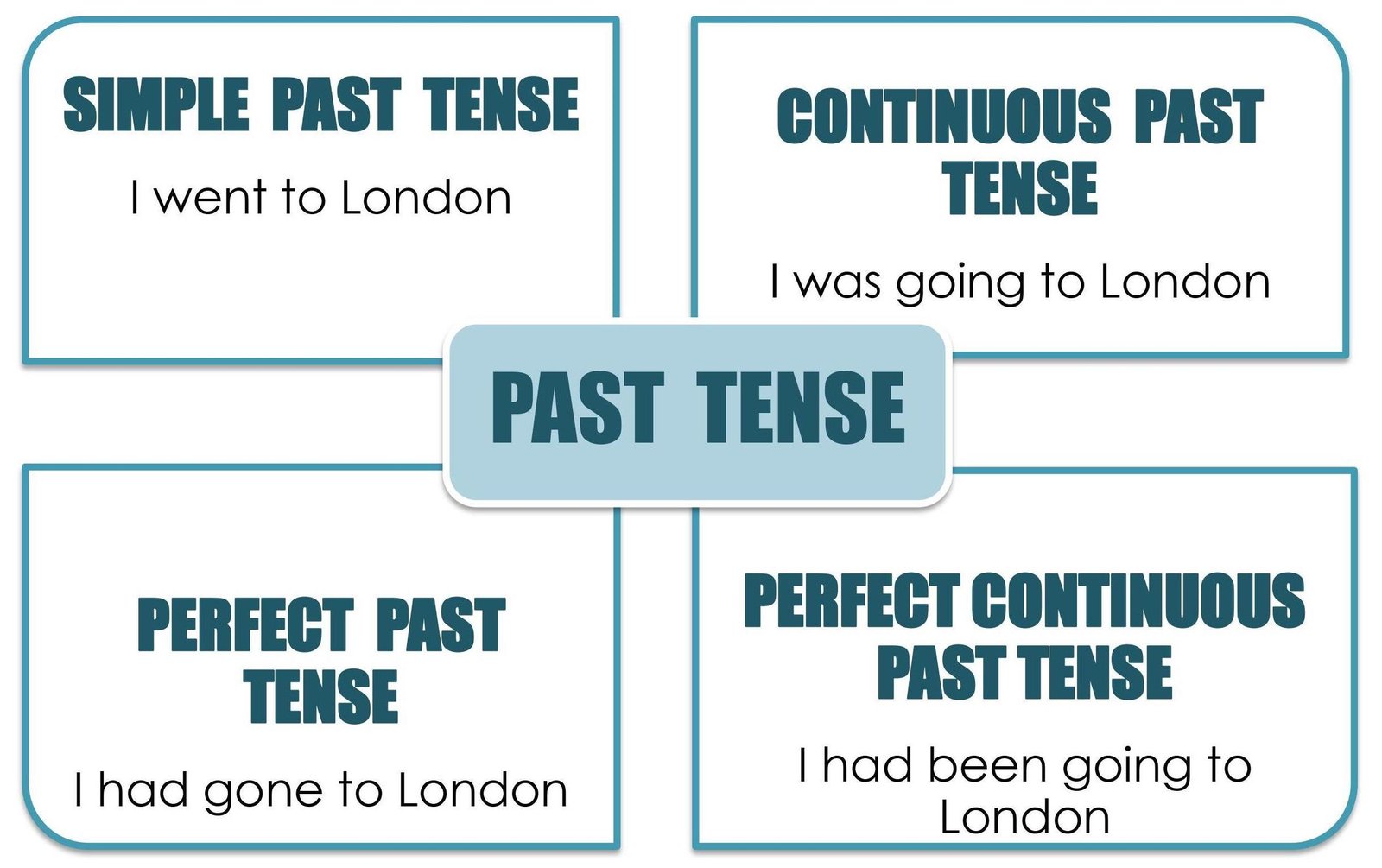
PAST TENSE Global ENGLISH CREATIVITY
Bring in Past Perfect Continuous Tense. Singular. Plural. I had been bringing. We had been bringing. You had been bringing. You had been bringing. He/She/It had been bringing. They had been bringing.

Bring Past Tense Verb Forms, Conjugate BRING
Future perfect continuous. I will have been bring ing. you will have been bring ing. he will have been bring ing. we will have been bring ing. you will have been bring ing. they will have been bring ing.
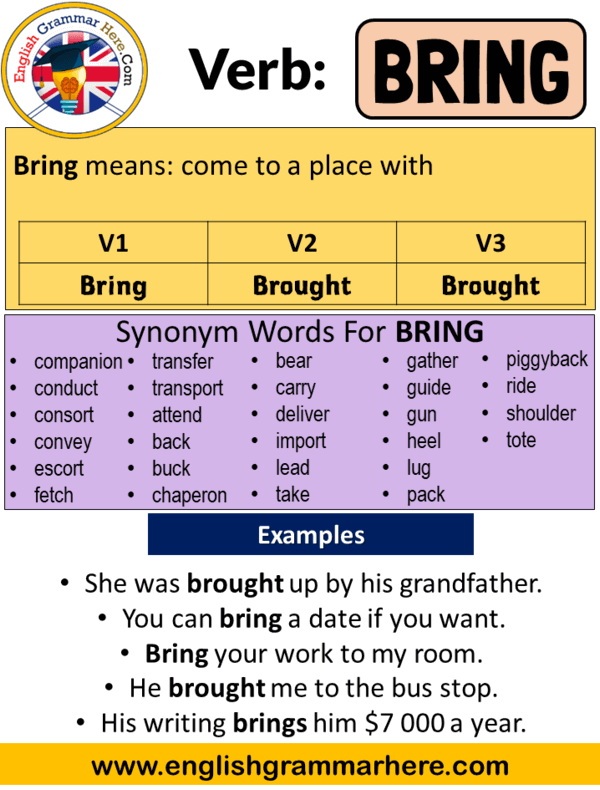
Bring Past Simple, Simple Past Tense of Bring Past Participle, V1 V2 V3 Form Of Bring English
Brought is the most common past tense and past participle of bring. Similar words like ring, sing, and spring are modified with an "a" or a "u" for their past tenses and participles, like rang and rung, but brang and brung, although recognized by many dictionaries, are widely considered nonstandard—even further from standard exists broughten.
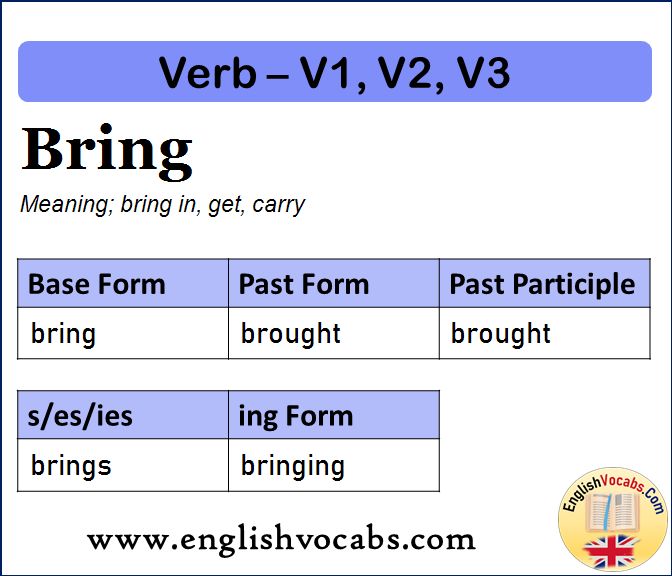
Bring Past Simple, Past Participle, V1 V2 V3 Form of Bring English Vocabs
Conjugate the verb bring in all tenses: present, past, participle, present perfect, gerund, etc.
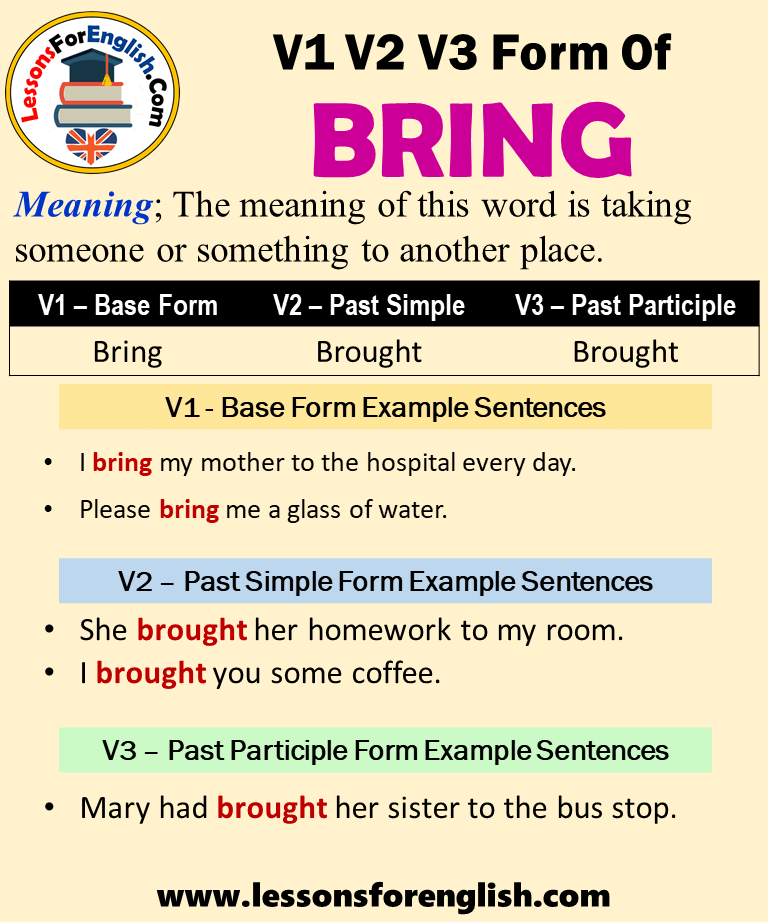
Past Tense Of Bring, Past Participle Form of Bring, Bring Brought Brought V1 V2 V3 Lessons For
past participle: (to) bring bringing brought definition in Spanish in French in Italian Indicative Perfect tenses Continuous (progressive) and emphatic tenses Compound continuous (progressive) tenses Conditional Imperative Subjunctive *Blue letters in conjugations are irregular forms. ( example)
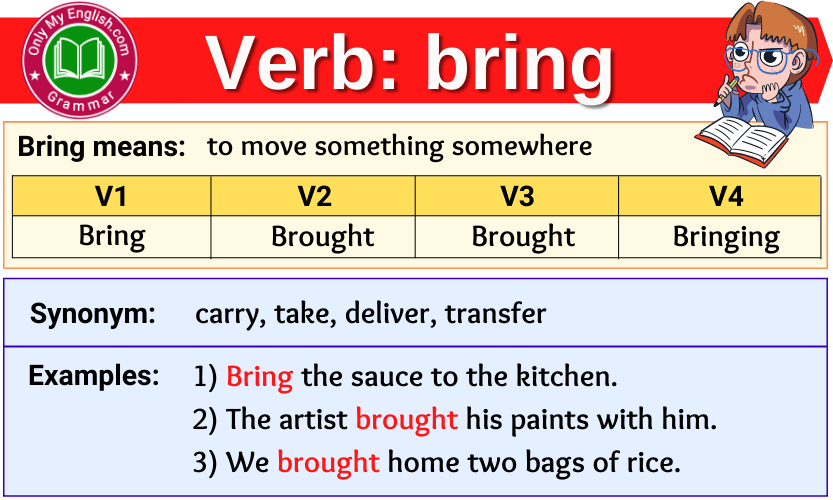
Bring Verb Forms Past Tense, Past Participle & V1V2V3 »
The meaning of BROUGHT is past tense and past participle of bring.

How to Tell the Differences Between Bring and Brought 4 Steps
Learn how to conjugate the verb "to bring" in English with bab.la, a free online dictionary and language learning platform. Find out the present, past and future forms of "to bring" in different tenses and moods. Compare and contrast with other verbs and languages.

Bring Past Simple Transborder Media
past tense of bring is brought. Bring verb forms Conjugation of Bring Simple / Indefinite Present Tense He/She/It brings . I bring. You/We/They bring. Present Continuous Tense He/She/It is bringing. I am bringing. You/We/They are bringing. Present Perfect Tense He/She/It has brought. I have brought. You/We/They have brought.

Bring past simple simple past tense of bring past participle v1 v2 v3 form of bring english
Conjugation verb bring X English British vs. American English Auxiliaries, modals Irregular verbs bring Infinitive to bring Preterite brought Past participle brought Model : bring Auxiliary : have, be Other forms: bring oneself / not bring Contractions Advertising Indicative Present I bring you bring he/she/it brings we bring you bring they bring

Verbs Archives Page 95 of 100 English Study Here
Bring means moving something or someone. The movement is either from where the listener is to where the speaker is, or from the speaker to the listener. Bring is an irregular verb. Its past tense and - ed form are both brought.
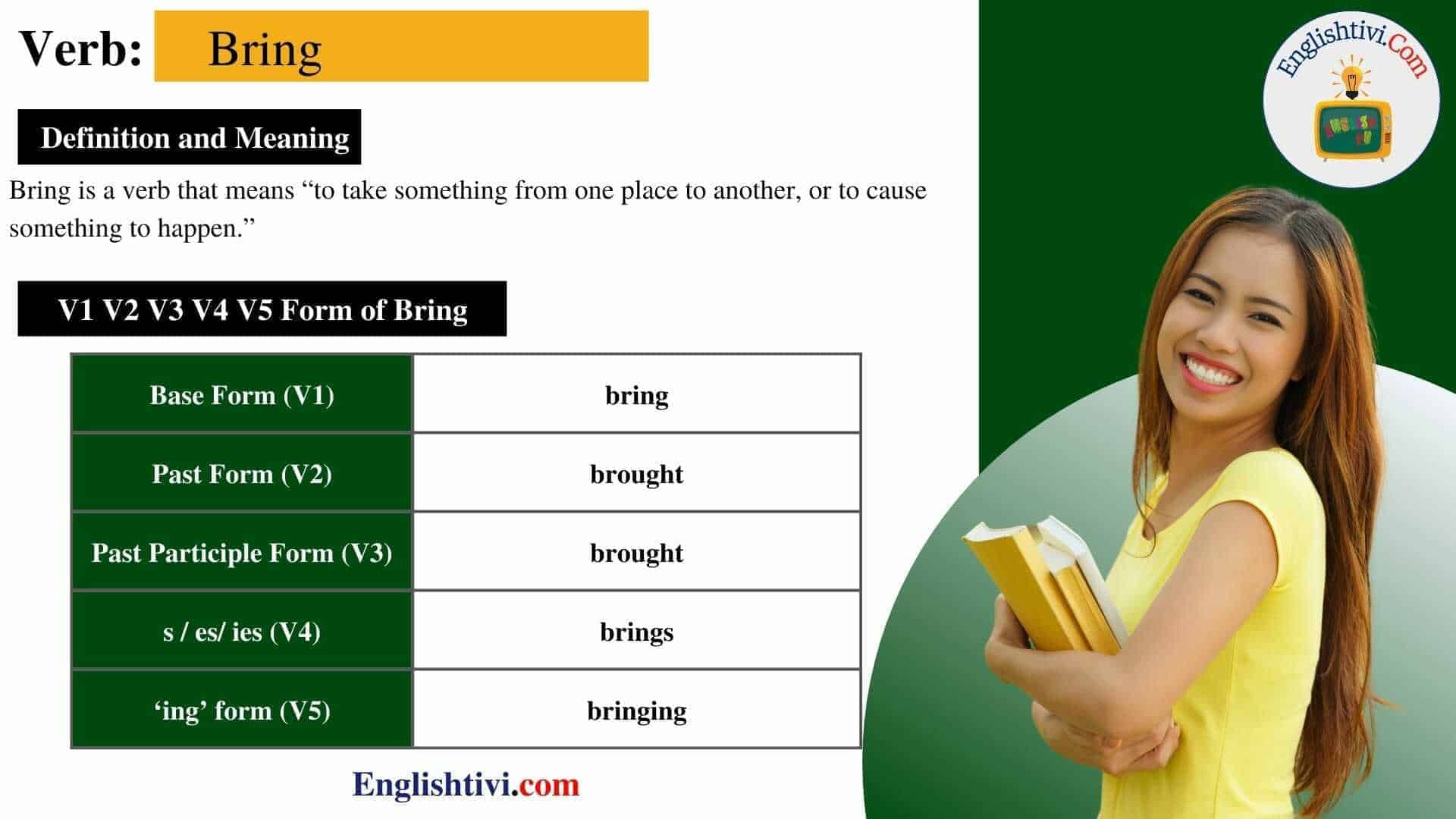
Simple Past Tense Of Bring
What is the past tense of the word "bring" The past tense (past participle) form of "bring" is "brought." The infinitive of the word form is "bring." The present participle form is "bringing." The past tense form is "brought" and past participle form is "brought." Understanding verb tenses

Past Tense Of Catch, English Grammar Pdf, Verb Forms, Grammar Police, Lead The Way, Learn
The past tense of BRING is BROUGHT. Pronunciation of BROUGHT. UK: / brɔːt / --- US: / brɔt / You can hear the pronunciation in the video. Example sentences with BROUGHT. The waiter brought my order to the table. I brought you something to eat. She brought her own cushion for the seat at the game.

Bring V1 V2 V3 V4 V5, Past Tense, Past Participle Form of Bring EnglishAwesome
The imperative mood is a grammatical mood that forms a command or request.. An example of a verb used in the imperative mood is the English phrase "Go." Such imperatives imply a second-person subject (you), but some other languages also have first- and third-person imperatives, with the meaning of "let's (do something)" or "let them (do something)" (the forms may alternatively be called.
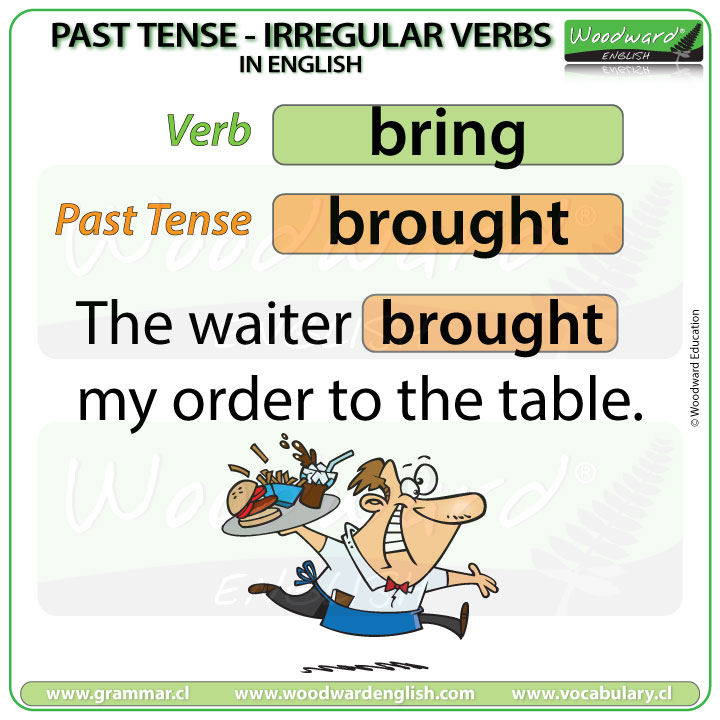
Past Tense of BRING in English English Grammar Lesson
Answer The past tense of bring is brought . The third-person singular simple present indicative form of bring is brings . The present participle of bring is bringing . The past participle of bring is brought . Find more words! bring Similar Words included invited admitted let in asked encouraged welcomed found procured provided contributed drew

BringPresentPastPast Participle TenseVerb Forms YouTube
December 18, 2022 past tense of, verbs Last updated on October 30th, 2023 at 01:36 pm Bring / brought shown in a text message conversation. Contents What's the past tense of bring? Bring, brought, or brung? Verb tenses of bring Brought vs. had/has/have brought Is bring a regular or irregular verb?